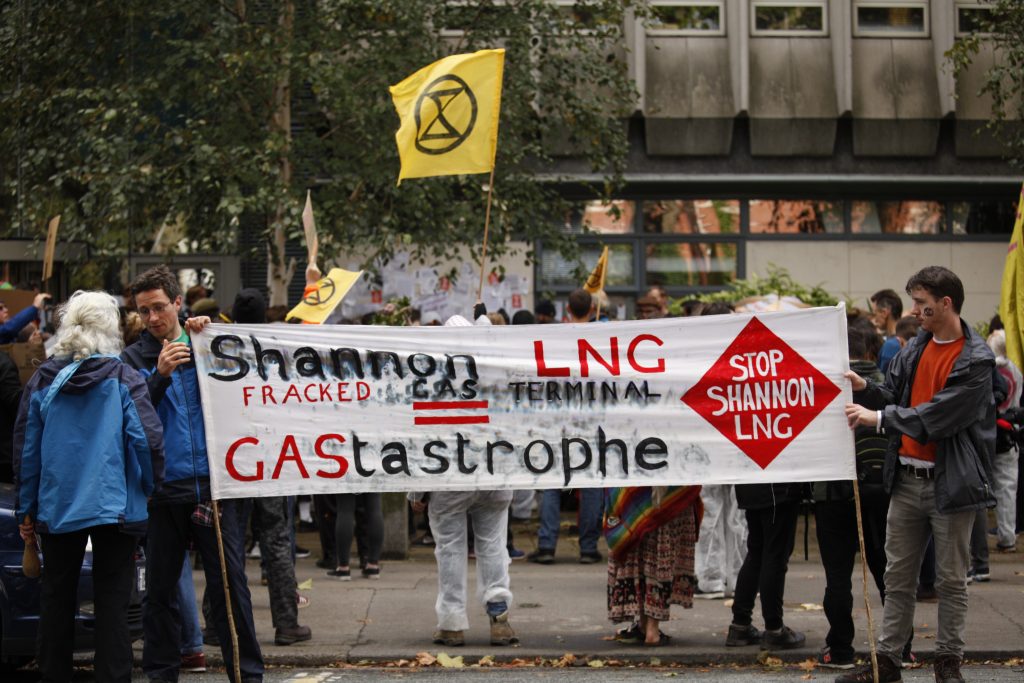Irish anti-fracking activist meets UN to discuss global fracking ban

March 6th, 2020
An Irish anti-fracking campaigner joined other activists, healthcare professionals and NGOs in New York this week to meet UN officials over their concerns with the controversial energy source.
Joining residents and campaigners from New York and Pennsylvania on Thursday, Eddie Mitchell of Love Leitrim met with Satya Tripathi, a UN Assistant Secretary-General and Head of New York Office at UN Environment (UNEP) to discuss possible support for a global ban on fracking.
The meeting was arranged on the back of an an open letter sent to the UN Secretary-General António Guterres last September that was organised by the environmental group Food & Water Action.
The letter was signed by over 450 activist groups, faith communities and celebrities including actor Mark Ruffalo, climate writers Naomi Klein and Bill McKibben and fashion icon Vivienne Westwood.
Love Leitrim campaigned tirelessly together with other grassroots and environmental groups to get a fracking ban on the political agenda in Ireland.
The group was instrumental in persuading former Sligo-Leitrim TD Tony McLoughlin to bring forward a Bill to prohibit onshore fracking that received support from across the political spectrum, passing into law in 2017.
Mr Mitchell warned, however, that fracked gas may still end up in Ireland through importation from the US to a proposed Shannon LNG gas terminal on the west coast.
“We banned fracking in Ireland because we listened to the alarm raised by affected communities like those living in Pennsylvania. We’re not going to facilitate the further poisoning of those people by importing fracked LNG into Ireland,” he said.

Legal challenge
The High Court recently granted leave to an environmental group to challenge the decision of the State and the European Commission to put forward the Shannon LNG gas terminal for the EU’s list of priority energy projects.
Friends of the Irish Environment [FIE] alleges that both Ireland and the EU failed to carry out independent sustainability, climate and cost-benefit analysis of the terminal before putting it forward for the fourth Project of Common Interest (PCI) list as is required under EU law.
Inclusion on the list – that includes over 50 new fossil fuel projects – gives large-scale energy projects access to a streamlined planning and permitting process, as well as making them eligible for access to multi-billion euro funding.
At a meeting of the Parliament’s Energy Committee (ITRE) last October, the Deputy Director of the Commission’s energy department admitted that the climate and sustainability review of proposed projects was not carried out for any of the projects nominated for the four PCI lists to date.
Shannon LNG – one of the liquefied natural gas terminal and pipeline projects on the list – faces strong criticism from scientists, activists and even Hollywood star Mark Ruffalo over the high likelihood that the project will see fracked US gas imported to Ireland despite a national ban on the practise here.
FIE’s action includes the Minister for Climate Action and the Attorney General as FIE alleges that the State failed to assess the project before approving its inclusion on the PCI list, including having regard to the Climate Change Act 2015.
FIE is also seeking a declaration that Ireland is in breach of its EU obligations to allow for proper public consultation in the environmental decision making process.
Andy Gheorghiu of Food and Water Action Europe said that the Shannon LNG case “isn’t simply a case about Ireland” but would have significant ramifications across Europe.
“Ireland is leading the way in challenging the fossil fuel lock in proposed by the European Commission in spite of the Green New Deal,” he said. “This is a real, effective Climate Action with far-reaching consequences for Ireland and Europe’s energy choices – and for all our futures.”
A previous legal challenge from FIE to the extension of planning permission for the terminal is currently before the European Court of Justice. A preliminary Advocate General’s opinion is expected at the end of April.
[x_author title=”About the Author”]







